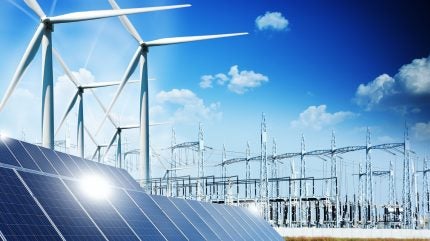
A new report released by the International Renewable Energy Agency, the Conference of Parties 30 (COP30) Brazilian Presidency, and the Global Renewables Alliance claims that despite achieving record progress last year, the world is still lagging in meeting its renewable energy and efficiency targets.
The report was released during a pre-COP30 event in Brazil’s capital, Brasília.

Discover B2B Marketing That Performs
Combine business intelligence and editorial excellence to reach engaged professionals across 36 leading media platforms.
Global renewable capacity additions reached 582GW in 2024.
The report, titled ‘Delivering on the UAE Consensus: Tracking progress toward tripling renewable energy capacity and doubling energy efficiency by 2030’, also highlights concerns about energy efficiency.
To achieve the COP28 UAE Consensus goal of tripling renewable energy capacity to 11.2TW by 2030, there is a requirement to add 1,122GW annually starting in 2025.
This necessitates a 16.6% annual growth rate through the decade.

US Tariffs are shifting - will you react or anticipate?
Don’t let policy changes catch you off guard. Stay proactive with real-time data and expert analysis.
By GlobalDataIn 2024, global energy intensity saw an improvement of only 1%, which falls significantly short of the 4% annual increase required to achieve the UAE Consensus goal and maintain the viability of the 1.5°C target.
The report recommends taking immediate steps, such as incorporating renewable energy goals into national climate strategies (NDC 3.0) before COP30, doubling the collective ambition of NDCs, and boosting investments in renewable energy to a minimum of $1.4tn annually from 2025 to 2030.
This proposed annual investment is more than twice the $624bn allocated in 2024.
UN secretary-general António Guterres said: “The clean energy revolution is unstoppable. Renewables are deployed faster and cheaper than fossil fuels – driving growth, jobs, and affordable power. But the window to keep the 1.5°C limit within reach is rapidly closing. We must step up, scale up and speed up the just energy transition – for everyone, everywhere.”
The report emphasised that major economies, particularly Group of Twenty (G20) nations, must lead the way.
G20 countries are expected to account for more than 80% of global renewables by 2030, with Group of Seven nations increasing their share to around 20% within this decade.
Despite a 7% growth in renewable energy investments in 2024, disbursements reportedly remain insufficient for robust project pipelines.
The report calls for fair trade practices for renewable technologies and international cooperation to safeguard trade corridors for key materials.
Moreover, investing strategically in the modernisation and expansion of electricity grids is crucial for integrating new capacity and enhancing energy security, the report stated.
From now until 2030, it is estimated that $670bn will need to be allocated annually to this grid infrastructure.
Additionally, further investments will be necessary to quickly expand energy storage solutions, support the integration of renewable energy sources, and ensure the stability of the grid.





